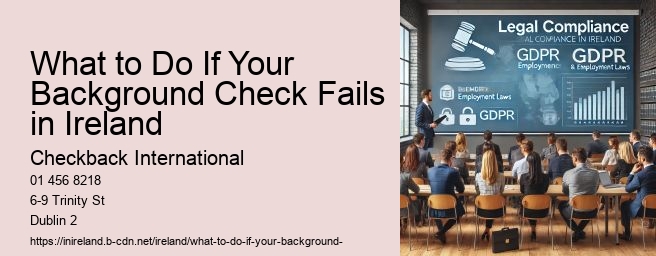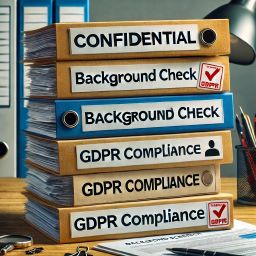

Consumer credit reports contain bankruptcy information, directorship history, and date of birth verification, with results delivered within 24 to 48 hours.
International qualifications need different verification processes than domestic credentials.
Online applications make the process simpler for candidates while meeting PSA guidelines.
Background checks in Ireland help organizations make informed hiring decisions by reviewing a candidate's history. These checks examine court records, bankruptcy information, and European criminal data. Following PSA 74:2019 Vetting Standards, businesses use tools and technology to verify candidates' identities, educational credentials, and work experiences. The process supports workplace safety and forms an important part of Irish business practices.
Pre-employment vetting in Ireland includes several screening processes such as European Criminal Record Checks, consumer credit assessments, and fitness evaluations. Organizations follow Data Protection Acts and GDPR requirements during background checks that verify credentials, criminal histories, and references. The process takes 5-10 working days and needs candidate consent. Each sector has specific vetting requirements, with additional protocols for regulated industries and security-sensitive positions. This system helps organizations evaluate potential employees thoroughly.
Companies appreciate how background checking providers handle complex information professionally and discreetly.
What Are the Costs Associated With International Background Checks?
Some employers need yearly updates, especially in sectors like healthcare or childcare.
After financial judgments review within Consumer Credit Stress Checks, the components of Consumer Credit Reports provide additional detail.

This refusal shows non-compliance with basic hiring requirements.
Processing duration varies based on the country and how quickly institutions respond.
Software systems allow comprehensive checks of criminal records, financial status, and work history.


These checks help confirm that candidates meet trustworthiness and safety requirements in sensitive sectors like finance and healthcare. Employers now often review candidates' public social media profiles during vetting, while following GDPR and data protection regulations. Each part of this process requires explicit consent from the candidate.
Background checks in Ireland are a key part of modern workforce screening, operating under strict regulations and professional standards.
2.Keep detailed documentation of all verification steps, consent forms, and screening results in compliance with data protection regulations.
Through database screening and multi-source verification, the consumer credit verification process examines candidates' financial history and reliability.
2.Processing Time: Delays can slow down hiring processes. Quality providers deliver fast results while maintaining thorough research.
Different Types of Background Checks

Checkback International's data protection practices include work with European inspectorates and credit agencies, maintaining compliance across all jurisdictions where background checks occur.
Pricing structure: Costs should match service quality, with clear fee schedules that support proper budget planning.
Fitness and Probity Checks (Central Bank of Ireland)

A background check in Ireland involves reviewing a person's criminal, financial, or personal records to assess their suitability for a role or position.
The duration can vary but typically takes between 1-2 weeks, depending on the type and complexity of the check.
Garda vetting is a specific type of background check required in Ireland for individuals working with children or vulnerable adults, involving checks against police records.
Yes, you must obtain consent from the individual before conducting any background checks in Ireland.
Not for all employees, but certain sectors such as healthcare and education may require comprehensive checks.
It includes checking for any criminal convictions or offences recorded against the individual.
Yes, individuals can request their own background checks in Ireland for personal review or to prepare for employment screenings.
Skipping background checks can lead to hiring unsuitable candidates, which may result in legal and reputational risks.
Yes, police clearance is a general criminal record check, while Garda vetting is specific to roles involving vulnerable groups and includes more detailed investigations.
You can request transcripts or degrees directly from educational institutions or use third-party services that specialize in educational verifications.
Information about spent convictions, certain types of personal data, and other protected characteristics under GDPR is off-limits unless specifically relevant and lawful to access.
International checks may involve additional complexities such as different laws, languages, and longer processing times.
No, background checks do not affect your credit score as they do not involve a credit inquiry that would impact the score.
Best practices include securing data in compliance with GDPR, limiting access to authorized personnel, and ensuring data is stored for only as long as necessary.
It depends on the industry and role, but typically every 2-3 years or when significant changes occur in the individual’s role or responsibility.
While not specific by law, many IT positions require checks due to access to sensitive or proprietary information.
GDPR regulates the processing of personal data, ensuring that background checks are conducted in a lawful, fair, and transparent manner.
Yes, but it must be done lawfully and with the individual’s consent, considering the relevance to the role.
Penalties can include fines, legal actions, and reputational damage, depending on the severity of the non-compliance.
Remote work has increased the importance of thorough background checks, especially for those in positions of trust or handling sensitive data.
Best practices include conducting similar checks as for permanent staff, especially if they have access to sensitive or critical areas.
Ensuring fairness involves following consistent procedures, obtaining consent, and allowing candidates to dispute inaccuracies.
Yes, it’s recommended to tailor background checks based on the specific risks and requirements of each position.
Signs include transparency about services, compliance with legal standards, positive reviews, and strong data protection practices.
Handling involves assessing the relevance to the job, discussing findings with the candidate, and considering legal and ethical implications.